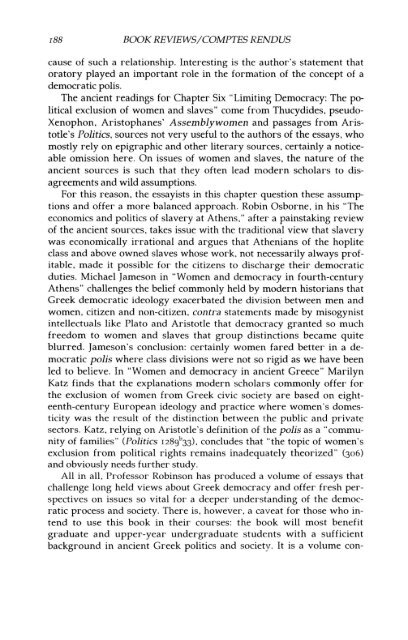MOUSEION - Memorial University of Newfoundland
MOUSEION - Memorial University of Newfoundland
MOUSEION - Memorial University of Newfoundland
Create successful ePaper yourself
Turn your PDF publications into a flip-book with our unique Google optimized e-Paper software.
188 BOOK REVIEWS/COMPTES RENDUS<br />
cause <strong>of</strong> such a relationship. Interesting is the author's statement that<br />
oratory played an important role in the formation <strong>of</strong> the concept <strong>of</strong> a<br />
democratic polis.<br />
The ancient readings for Chapter Six "Limiting Democracy: The political<br />
exclusion <strong>of</strong> women and slaves" come from Thucydides, pseudo<br />
Xenophon. Aristophanes' Assemblywomen and passages from Aristotle's<br />
Politics. sources not very useful to the authors <strong>of</strong> the essays. who<br />
mostly rely on epigraphic and other literary sources, certainly a noticeable<br />
omission here. On issues <strong>of</strong> women and slaves. the nature <strong>of</strong> the<br />
ancient sources is such that they <strong>of</strong>ten lead modern scholars to disagreements<br />
and wild assumptions.<br />
For this reason. the essayists in this chapter question these assumptions<br />
and <strong>of</strong>fer a more balanced approach. Robin Osborne, in his "The<br />
economics and politics <strong>of</strong> slavery at Athens," after a painstaking review<br />
<strong>of</strong> the ancient sources. takes issue with the traditional view that slavery<br />
was economically irrational and argues that Athenians <strong>of</strong> the hoplite<br />
class and above owned slaves whose work. not necessarily always pr<strong>of</strong>itable.<br />
made it possible for the citizens to discharge their democratic<br />
duties. Michael Jameson in "Women and democracy in fourth-century<br />
Athens" challenges the belief commonly held by modern historians that<br />
Greek democratic ideology exacerbated the division between men and<br />
women. citizen and non-citizen. contra statements made by misogynist<br />
intellectuals like Plato and Aristotle that democracy granted so much<br />
freedom to women and slaves that group distinctions became quite<br />
blurred. Jameson's conclusion: certainly women fared better in a democratic<br />
polis where class divisions were not so rigid as we have been<br />
led to believe. In "Women and democracy in ancient Greece" Marilyn<br />
Katz finds that the explanations modern scholars commonly <strong>of</strong>fer for<br />
the exclusion <strong>of</strong> women from Greek civic society are based on eighteenth-century<br />
European ideology and practice where women's domesticity<br />
was the result <strong>of</strong> the distinction between the public and private<br />
sectors. Katz. relying on Aristotle's definition <strong>of</strong> the polis as a "community<br />
<strong>of</strong> families" (Politics I289 b 33). concludes that "the topic <strong>of</strong> women's<br />
exclusion from political rights remains inadequately theorized" (306)<br />
and obviously needs further study.<br />
All in all. Pr<strong>of</strong>essor Robinson has produced a volume <strong>of</strong> essays that<br />
challenge long held views about Greek democracy and <strong>of</strong>fer fresh perspectives<br />
on issues so vital for a deeper understanding <strong>of</strong> the democratic<br />
process and society. There is. however, a caveat for those who intend<br />
to use this book in their courses: the book will most benefit<br />
graduate and upper-year undergraduate students with a sufficient<br />
background in ancient Greek politics and society. It is a volume con-

















